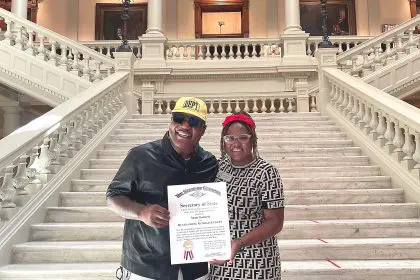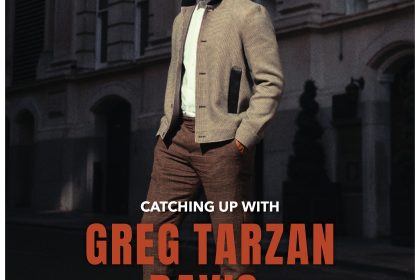
Words and Images by Todd Williams
ESPN has changed a lot in the last decade and a half. More than just the titles and theme music, more than just the names behind the desks of such popular shows as “NFL Primetime” and “Baseball Tonight.” The shift at the world’s top sports network was much more subtle and gradual, a shift of mind-set. In 1992, the landscape of sporting news was largely dominated by white males, both in front and behind the camera. If the changes since the early ’90s can be traced to one ‘tipping point,’ that point is Stuart Scott. Scott started at ESPN in 1993, and – at the risk of being hyperbolic – the world of sporting news hasn’t been the same since.
“I think the job for African American sportscasters 14 years ago was tougher because there weren’t that many,” Scott says. But Scott humbly disregards his own significance in the changes since then; instead, he praises those who laid the groundwork for him to do what he does. “Whenever I see Jim Hill, a sportscaster in L.A. [who’s] been local [in] L.A. for a long time, I thank him,” he continues, acknowledging that this thing didn’t begin with Stuart Scott. “I thank James Brown, who’s with CBS now; I thank John Saunders, who works here, I thank Robin Roberts. Those are the people on a national level who opened doors for me to come here. I hope that we are all opening doors for everyone else.”
Scott started working in Florence, S.C., his first year out of college and had stints in Raleigh, N.C., and Orlando, Fla., prior to setting up shop at the ESPN campus in Bristol, Conn. His career wasn’t without naysayers, however, and Scott is thankful for them. He’s equally appreciative of the support that he received from some not-so-famous mentors during his formative years in front of the camera. “I never really had early inspirations and influences as a sportscaster – I didn’t grow up wanting to be a sportscaster, all I wanted to do was play [football]. The only sportscasters who influenced me weren’t people that I necessarily wanted to be like per se, but just people who believed in me when I was young in the business starting out,” he explains, smiling nostalgically as he reminisces. “Names you may never know, like Rick Henry, who I worked under in my first job, Denise James, Ron Savage, Jeff Bradley, Miriam Thomas – people who, when I was interning, helped me and gave me inspiration to not give it up when 25 different networks were saying, ‘We don’t have a job for you’ and two or three were saying, ‘You stink [and] you’ll never work in this business.’ ”
Obviously, Scott didn’t allow early hurdles to break his sprint for the finish line. ESPN grabbed him, and Scott quickly became one of the networks most visible personalities. “[I’ve] been here at the network for almost 13 years – which means I’m old,” he says, before sarcastically clarifying, “but actually I started when I was 12 – so I’m 25 this year, that’s the story we’re going to go with.” His sense of humor and commitment to providing the most informative, in-depth analysis became his calling cards, and since coming to the network, he has created a trademark brand of “Stuartspeak” that’s as identifiable as SportsCenter’s theme music. The phrases “Boo- Yah!” and “As cool as the other side of the pillow,” are etched into every sports fan’s consciousness – and more than a few sportscasters’. Scott downplays his influence on the younger personalities at ESPN and in sportscasting in general, he sees it as a cultural shift, more than the direct influence of one man.
“I don’t know if I hear so much of my influence with some of the younger people coming up now,” he shares. “Hopefully, the influence I hear is the idea that it’s cool to be whoever you are. You don’t have to modify whatever your personality may be. I’ve heard people say before, when you might see somebody drop a little hip-hop, or a little bit of an Afrocentric vibe, people [say], ‘Oh, he’s trying to be like Stuart Scott.’ I don’t think they’re trying to be like Stuart Scott. You don’t hear that when you see a sportscaster from a different culture, [who] may be doing the same thing that other sportscasters have done. You [just] think ‘oh, he’s just being him’ or ‘she’s just being her.’ I don’t think there’s a ‘Stuart Scott’ vibe, I think there’s a freedom-to-be-expressive vibe.”
Scott is certainly expressive, and while the cultural and generational shift that has happened during Scott’s tenure at ESPN can’t be disavowed; one must also acknowledge Scott’s undeniable charisma and on-air persona have influenced many of his colleagues – regardless of color. Younger SportsCenter anchors like Scott Van Pelt and Anthony Aimee bear Scott’s influence, and much of the Fox Sports Network owes him a debt of gratitude. The sports news community is a lot like an extended family, and the ESPN family is as tight-knit a clan as the Jacksons or the Baldwins. Scott has a few theories as to where that uncanny closeness comes from. “The camaraderie we have comes from [a few] different sources,” he reveals. “There’s a different vibe when you work together 9 to 5 and when you work together [from] three or four in the afternoon until midnight or one o’clock. The late hours just foster some kind of . something. When you’re with somebody at midnight and you’ve been with them all day and everybody’s tired; you’re going to have a certain [type] of closeness. [Also], a lot of us have worked here for a long time. The people who’ve worked here for a long time, we’ve kind of grown up together in the sense that all of us came here either young [and] not married, or young and newly-married, so the conversations have changed. Thirteen [or] 14 years ago when I got here, what I talked about with my colleagues was completely different. It was ‘Hey, let’s go out after the show and grab a beer’; now it’s ‘I’m tired because I had a parent-teacher conference,’ [or] ‘I had to take my daughter to tae kwon do.’ ”
Maturing professionally and personally certainly changed Stuart Scott’s perspective. No longer the young upstart, he can now take pride in the ones coming after him and in the progress that has been made over the years. Scott’s gone from being ‘the brotha at ESPN,’ to now being an elder statesmen shepherding the new wave of young black sports reporters. “I’ve done shows with African American anchors, [“Entertainment Tonight’s”] Kevin Frazier; Ian Page, who’s a great sportscaster with the golf channel, [and] it’s nice to see the African American anchors that we have now,” Scott pauses thoughtfully. “But I’ll tell you what’s even nicer – and it took a long time – but I remember the night it happened: for every show there are two anchors, a producer and a coordinating producer. We have these little pods that we work at – just little four-person pods in the newsroom. One day I was doing a show with Stan Verrett. We all sat down at the pod, and we had a black producer and a black C.P. – the pod was black.” Scott smiles, obviously still joyful of the strides made at the network behind the scenes. “Yes, it took a long time, and, on the one hand, I could say ‘well, it took too long,’ ” he continues. “But on the other hand, I remember sitting there and saying ‘man, look at this, this is cool.’ It didn’t matter that it had taken so long, it just mattered that there we were. African Americans doing the show, creating the show – creating everything about the show.”
Again, hyperbole aside, it’s not outside the realm of reason to credit Stuart Scott’s presence and successes as at least part of the reason that victory in the production booth was possible. But, even as more young talents like him begin to pepper the horizon of sports reporting, Stuart Scott remains an original – and he recommends that they all should be likewise. “Don’t try and be somebody else,” he advises. “People hear that all the time, but what that means is – don’t think ‘I can be successful if I was like him or her,’ you don’t know who ‘him or her’ is. Success can only be the best you. If the best you [means] allowing yourself to feel silly or emotional, to feel strong or feel worried, allow yourself to feel that. Bob Costas, James Brown, Jim Hill, John Saunders – they’re all great sportscasters, and I’m not trying to be like any of them – because they’re not me.” He points to himself, before adding: “All I can do is be this right here, so I’ve got to try to be the best ‘me.’ ”










